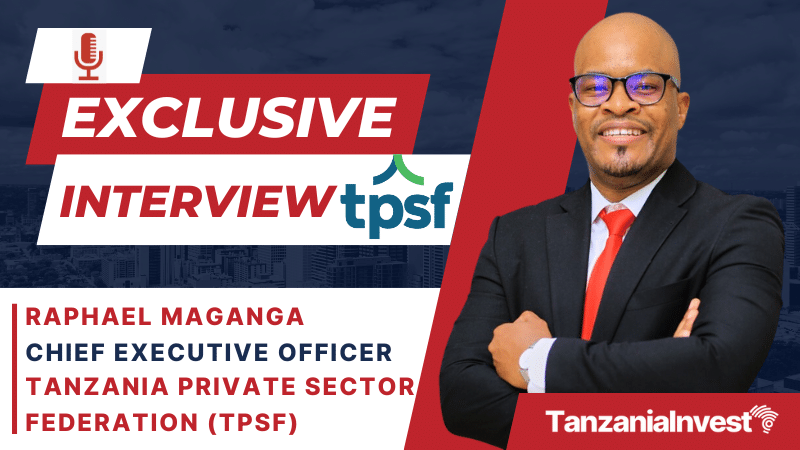In this exclusive interview with TanzaniaInvest, Raphael Maganga, Chief Executive Officer of the Tanzania Private Sector Federation (TPSF)—the leading organization representing and advocating for the interests of the private sector in Tanzania—provides a comprehensive overview of the state of Tanzania’s private sector.
The discussion highlights the pivotal role TPSF plays in fostering economic growth, the challenges facing private enterprises, the innovative initiatives supporting SMEs and entrepreneurs, and the opportunities that Tanzania’s evolving business landscape offers to investors and stakeholders alike.
The private sector in Tanzania plays a leading role in the development of the economy. Can you describe the current state and key challenges of Tanzania’s private sector?
The private sector in Tanzania plays a pivotal role in driving our nation’s economic growth. We are witnessing robust development across various sectors, yet we also face significant challenges. These include access to finance, regulatory hurdles, and the need for improved infrastructure. TPSF is committed to addressing these challenges by advocating for a conducive business environment and fostering dialogue between the government and private sector to ensure sustainable growth.
“The private sector in Tanzania [is] witnessing robust development across various sectors, yet we also face significant challenges. These include access to finance, regulatory hurdles, and the need for improved infrastructure.”
TPSF was established to support and advocate for the private sector. What are TPSF’s main functions, and what are the most recent initiatives? How have these initiatives impacted the private sector?
TPSF’s core functions are to support and advocate for the interests of the private sector in Tanzania. We have recently launched several initiatives aimed at enhancing the business environment, such as the Public-Private Dialogue (PPD) platforms, which have led to policy changes that benefit businesses. Our focus on capacity-building programs for SMEs and entrepreneurs has also shown positive outcomes, enabling them to thrive in a competitive market.
“TPSF’s core functions are to support and advocate for the interests of the private sector in Tanzania.”
Additionally, one of our key projects is the African Franchising Program, launched in 2021. This initiative supports 100 Tanzanian businesses in developing franchise models to scale operations nationally and regionally. The first phase, concluding in 2025, involves building systems and operations for these businesses.
By 2026, we plan to focus on accessing finance for scaling up, supported by a revolving fund in partnership with the African Development Bank, ultimately transforming into a franchising bank for entrepreneurs across East Africa.
SMEs and entrepreneurs are the backbone of a thriving economy. What mid and long-term plans does TPSF have to support SMEs and entrepreneurs in Tanzania?
SMEs and entrepreneurs are the backbone of our economy. TPSF is dedicated to their success by implementing long-term strategies that include improving access to finance, providing training and mentorship, and advocating for policies that reduce the barriers to entry. Our mid-term plans involve scaling up these support systems and creating a more enabling environment for innovation and entrepreneurship in Tanzania.
“Our mid-term plans involve scaling up these support systems and creating a more enabling environment for innovation and entrepreneurship in Tanzania.”
Notably, the African Franchising Program has demonstrated a significant focus on sectors such as agriprocessing and food processing. Many participating businesses are women-led or youth-led enterprises, contributing to the agricultural value chain. By transforming this sector, we aim to lift many out of poverty and achieve sustainability.
Collaboration between the public and private sectors is vital for economic progress. How does TPSF approach its relationship with the government and foster public-private partnerships (PPPs)?
Collaboration between the public and private sectors is essential for Tanzania’s economic progress. TPSF actively engages with the government through structured Public-Private Dialogues (PPDs) to address issues affecting businesses and promote investment. We also facilitate the establishment of Public-Private Partnerships (PPPs) to leverage resources and expertise from both sectors, ensuring that our development goals are met efficiently.
“TPSF actively engages with the government through structured Public-Private Dialogues (PPDs) to address issues affecting businesses and promote investment. We also facilitate the establishment of Public-Private Partnerships (PPPs).”
TPSF has been instrumental in utilizing the Tanzanian National Business Council (TNBC) platform, the sole structured dialogue framework between the private and public sectors. This platform has been a critical tool in advocating for private sector-friendly reforms under President Samia Hassan’s pro-business administration.
Key achievements include advocating for the establishment of a Presidential Tax Commission to overhaul the outdated tax regime, a long-standing barrier to investment and trade expansion. TPSF continues to lead dialogue with the government to implement holistic tax reforms that will foster business growth and attract investments.
You were appointed as the head of TPSF this year. How do you intend to leverage your expertise and experience to further grow the institution and promote private sector development and the ease of doing business in Tanzania? What would be your one message to policymakers in relation to the ease of doing business in Tanzania?
As the CEO of TPSF, I am committed to leveraging my experience to strengthen our institution and further promote private sector development. My focus will be on enhancing the ease of doing business in Tanzania by advocating for reforms that simplify processes, reduce costs, and increase transparency across all sectors.
“My focus will be on enhancing the ease of doing business in Tanzania by advocating for reforms that simplify processes, reduce costs, and increase transparency across all sectors.”
To potential investors, I emphasize that Tanzania is among the fastest-growing economies in Africa, characterized by political stability, strong macroeconomic policies, abundant resources, and strategic geographic positioning.
The country provides access to a market of 700 million people in the East African region and beyond, through frameworks such as the African Continental Free Trade Area.
For businesses joining TPSF, the benefits include market intelligence, data for informed decision-making, and platforms for policy advocacy at all levels.










